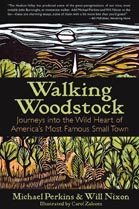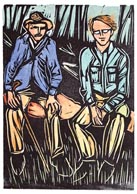Walking as a Subversive Activity with Poets Will Nixon and Michael Perkins
 Two poets hover over lunch at the Hurley Mountain Inn: one is droll, a suave curmudgeon; one has the affable demeanor of a William H. Macy character. One drives a hybrid; one hates cars altogether. One got lost on a mountain because he didn’t believe his compass; one slipped on leaf-covered ice because he’d put his cleats on inside out. One commutes to work on foot and collects walking sticks; one collects peaks and currently practices no visible means of income. They both order burgers: one beef; one buffalo. And they both love Hart Crane’s work.
Two poets hover over lunch at the Hurley Mountain Inn: one is droll, a suave curmudgeon; one has the affable demeanor of a William H. Macy character. One drives a hybrid; one hates cars altogether. One got lost on a mountain because he didn’t believe his compass; one slipped on leaf-covered ice because he’d put his cleats on inside out. One commutes to work on foot and collects walking sticks; one collects peaks and currently practices no visible means of income. They both order burgers: one beef; one buffalo. And they both love Hart Crane’s work.
Their identities have been scrambled in that last paragraph so as to keep the reader guessing, but anyone who peruses the Woodstock Times or enjoys local poetry and the great outdoors will soon recognize Will Nixon and Michael Perkins, co-authors of the newly released collection of essays Walking Woodstock: Journeys into the Wild Heart of America’s Most Famous Small Town. Together they walked across Woodstock, mostly off road along the village waterway and through its abandoned forest paths—a plan hatched at a poetry gathering a while back. Their book chronicles this adventure in segments, and then follows the pair on a quest to walk the lost roads of the region and later to walk the properties held by the Woodstock Land Conservancy. It’s a pleasant read that entertains with “humor, history, friendship, nature, hikers’ lore, and walkers’ musings,” as the promotional blurb says. They touch on environmental issues still to be resolved, not just to voice their own preferences but to call attention to the urgency of an ecologically sound resolution. Their remembrances of past hikes, like Perkins’ week-long trek from Woodstock, New York to Woodstock, Connecticut in 1987 to celebrate the Woodstock Bicentennial, are enjoyable and informative. Their handy tips, like “don’t block the path of an oncoming ATV and provoke a thrashing” can be translated to good use for even those of us who may never tread the rail trail on Route 209.
Yet this is no mere guidebook, and sitting with them for an hour to hear about their pedestrian ramblings, I sense a deeper meaning—one intentional, even subversive. These guys are out to revitalize our species’ right to experience what that other radical poet, Gary Snyder, calls wild nature and who writes things like, “Nature is not a place to visit, it is home…” and “…lots of walking brings us close to the actually existing world and its wholeness.” As opposed to the virtually existing world and all its fragmentation, that is. Our talk veers to the symptoms of humankind separated from that right, such as the condition our young people suffer, dubbed “nature deficit disorder” by Richard Louv, author of The Last Child in the Woods, or the unconscionable ravages of a level of development that is neither sustainable nor desirable. “Development for development’s sake really just fills the pockets of those people who develop,” says Perkins. “It doesn’t help the people who live here. There’s another way of living.”

Illustrations by Carol Zaloom
Perkins—also a novelist, critic and editor, and author of several local histories—gave up driving a car twenty years ago. Acknowledging that it would not have been feasible during his childrearing years, he’s happy now to withhold life support from the oil and auto industries. Each day he hikes three miles overland to get to work and three miles back. He was Program Director of the Woodstock Guild for many years, and chairman of the Woodstock Bicentennial Celebration. He directs the Woodstock Library Forum, now in its twenty-fourth year. Nixon has earned his merit badge with the Catskill 3500 Club, an enthusiastic group of peak-baggers (Perkins calls them “peak braggers”), and when he first moved to Woodstock thirteen years ago he’d walk the streets in the evenings with flashlight in hand to get a lay of his new homeland. The author of three books of poetry, most recently My Late Mother as a Ruffed Grouse, Nixon has been a freelance environmental journalist for The Amicus Journal, published by the Natural Resources Defense Council, Adirondack Explorer, and other magazines.
Nixon and Perkins met as kindred spirits who’d already spent a great deal of life on foot—walking the roads, hiking the terrain, strolling the neighborhoods in which they’ve lived—and who have come to realize a sort of psycho-socio-biological value in direct immersion into the environment. They pose the question to us all: how can we truly care about an ecosystem if we aren’t at least familiar with it? The inverse is obvious: if we don’t know, we don’t care. To say these guys are driven to put one foot in front of the other across the planet suggests an incongruent metaphor, one they’d perhaps not appreciate—so, let’s call them determined: to reestablish themselves as bipeds, to rediscover the local environment in all its permutations, and to reconnect with the earth in a non-harmful manner. To that end, they walk. Just as countless other poets, philosophers, prophets, meditators, and wise mothers with babies in strollers have done for centuries. Fellow poet Clark Strand recognizes walking to be the “first alternative religion and … most venerable revolutionary act.”
A champion for the protection of wilderness, Nixon points out that walking is so natural for people. It feels good, and certainly exposing yourself to astonishing vistas and surprising landscapes satisfies the soul. He identifies two essential personal benefits derived from walking: “Freedom—walking gives you freedom in a way that nothing else does. Friendship—it’s deepened over the experience of walking together. I feel people are at their best when they’re walking, and you find that repeatedly, even at the malls!” Meanwhile, Perkins is nobody’s fool concerning the utility of the combustion engine—he does use public transportation, and he was once whisked off the mountain by an ambulance (an episode recounted by both in the book). Still, his gesture inspires, and he interjects, “By my example I might encourage other people. Here’s one way to live in the environment. We don’t need cars all the time.” Simple as that—the exact balance of Snyder’s “spirit and humility.”
Nixon and Perkins will join with the Golden Notebook to host a “Foot Stompin’ Book Party” to celebrate the release of Walking Woodstock: Journeys into the Wild Heart of America’s Most Famous Small Town at the Kleinert/James Arts Center in Woodstock on Sunday, December 6 from 3:00 to 5:00 pm, with foot stompin’ music to be provided by Bruce Ackerman, Spider Barbour and Julie Parisi Kirby and Laurie Kirby. Walk on in and meet them. For more information call 845 679 8000.